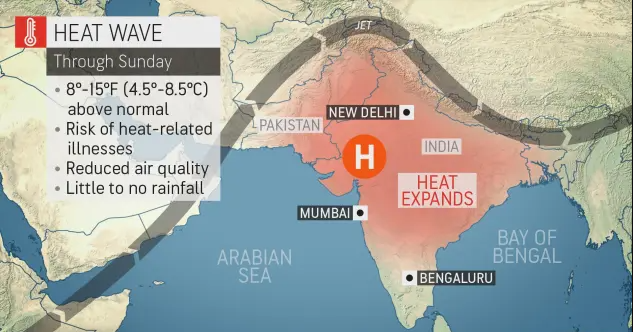The absence of rain and Reason it is so hot almost everywhere in India
- Severe heat conditions have been consistently reported over large parts of India since the beginning of the summer season in March this year.
- Maximum temperatures in west Rajasthan and Vidarbha in Maharashtra have remained between 40 degrees and 45 degrees Celsius throughout the last two months.
Unusual Early Summer
- The country has already seen as many as four heat waves since March.
- There have been at least 26 heatwave days since the beginning of March, and as many as four spells of heatwaves in a little over a month and a half.
- The last of these heat waves remains ongoing.
- The first wave lasted from March 11 to 19, and affected Kutch-Saurashtra, northern Konkan and Madhya Maharashtra, Rajasthan, Delhi, Punjab, Himachal Pradesh, Jammu, West Madhya Pradesh, West Uttar Pradesh and interior Odisha.
- The 2nd started on March 27 was long and abated only on April 12.
- It hit all the regions that were affected by the first heatwave, and also spanned Uttarakhand, Jharkhand, Chhattisgarh, Rayalaseema and East Madhya Pradesh etc.
- The 3rd heatwave started on April 17, This was relatively short, lasting until April 20, and was largely restricted to Delhi, Rajasthan, East Uttar Pradesh, Bihar, and Vidarbha.
- The 4th heatwave spell commenced on April 24 over Kutch-Saurashtra and Rajasthan, remains ongoing.
Technical definition for this Meteorological Phenomenon
The India Meteorological Department (IMD) declares a heatwave for a region when the maximum temperature reaches at least 40 degrees Celsius in the plains, at least 37 degrees Celsius along the coast, and at least 30 degrees Celsius in hilly regions.
- A heatwave is declared when the maximum temperature rises by between 4.5 degrees Celsius and 6.4 degrees Celsius above normal.
- A severe heatwave is declared when the maximum temperature departs from normal is more than 6.4 degrees Celsius.
- A third condition for a heatwave arises when an area records a maximum temperature of more than 45 degrees Celsius and up to 47 degrees Celsius on any given day.
Regions most Vulnerable to Heatwaves
The most heatwave prone areas - known as the Core Heatwave Zone (CHZ) - are Rajasthan, Punjab, Haryana, Chandigarh, Delhi, West Madhya Pradesh, Uttar Pradesh, Chhattisgarh, Orissa, Vidarbha in Maharashtra, parts of Gangetic West Bengal, Coastal Andhra Pradesh, and Telangana.
- Heatwaves can last between 4 and 10 days, and occasionally for longer. Heatwave spells in May are longer than those that occur in April and June, mainly because of the absence of rainfall.
- Studies have shown that the CHZ experiences more than six heatwave days every year during these March to June months.
- Many places in the northwest (Rajasthan) and cities along eastern coast (Andhra Pradesh, Odisha) report up to eight heatwave days in a season.
- Regions in the extreme north (Himachal Pradesh, Kashmir, Ladakh), northeast, and southwest (Karnataka, Kerala, Goa) are less prone to heatwaves.
Reasons for an Early Onset of Summer
The usual light-intensity rainfall, hail and lightning have remained absent by and large over many areas of the country since March.
- The country’s all-India rainfall ended at minus 70.7 percent in March.
- March 2022 was India’s third warmest March since 1901.
- The monthly maximum temperature was 32.65 degrees Celsius against the normal of 31.24 degrees, the IMD said.
- Normally, passing western disturbances – the eastward propagating stream of winds originating from the Mediterranean Sea – interact with moist winds blowing from southern India to trigger thunderstorms.
- The intermittent light rain and thunder helps keep a check on the heat.
- This summer, the western disturbances have not been sufficiently strong.
- Even though five western disturbances have been recorded since March, three of these were feeble and passed over the extreme northern regions of the country, failing to cause significant changes in weather.
- Over south peninsular and northeast India, however, April has been wet.
- As a result, the summer has been relatively cool in these areas.
- The rainfall departures from normal during the period March 1-April 26 were 50.4 percent and 49.7 percent over south peninsular and northeast India respectively.
Exam Track
Prelims Takeaway
- Heatwaves
- Regions prone to heatwaves
- Indian Meteorological Department (IMD)


